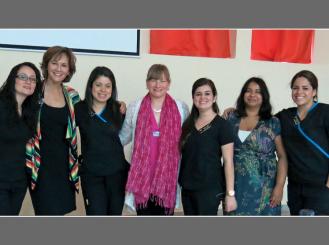Oct 15, 2015
Palliative care has become an increasingly important issue in cancer care, both in the United States and internationally. In June, ASCO’s International Cancer Corps (ICC) held a Palliative Care Workshop (PCW) at the Hospital San Felipe in Tegucigalpa, Honduras.
The ICC program is a partnership between ASCO and Health Volunteers Overseas (HVO), an international medical education organization. The aim of the ICC program is to exchange medical expertise, develop training programs, and build long-term, supportive relationships between ASCO and the clinicians who provide cancer care in countries that have an HVO/ICC presence.
To find out more about the program and the volunteer experience, ASCO Connection spoke with the three ICC volunteers who helped create the four-day PCW in Honduras: Lisa Kennedy Sheldon, PhD, ANP-BC; Connie Dahlin, ANP-BC, ACHPN; and Shail Maingi, MD.
AC: What is palliative and oncology care like in Honduras?
ICC Volunteers: Honduras has large public hospitals in two cities: Tegucigalpa and San Pedro Sula. These hospitals provide the majority of oncology care in the country. Patients often travel for many hours to receive care at these hospitals.
Families are very involved in patient care in the hospital setting and are often fully responsible for care outside the hospital, as there are no entities to offer home clinical services.
Unfortunately, many of the patients present with advanced cancers. Even those patients who present with early-stage and potentially curable cancers have trouble accessing the necessary treatments, primarily due to limitations related to cost and availability. This results in a tremendous burden of cancer symptoms that require palliation.
AC: How did the PCW help local health care professionals?
ICC Volunteers: In order to better equip health care professionals working in the public health system in Honduras, we worked closely with our hosts to provide a curriculum that best met their palliative care and supportive oncology needs.
The course covered topics related to pain management, communication and psychosocial care, medical management of symptoms, oncologic emergencies, and program development. The interprofessional audience included doctors, nurses, social workers, psychologists, nutritionists, medical students, residents, fellows, and volunteers from community-based organizations.
In addition to didactic lectures, small work groups met daily to discuss case studies and resource issues. Opportunities and barriers to the development of local and national palliative care services and programs were also explored.
AC: What did volunteers do while they were in Honduras?
ICC Volunteers: The ASCO ICC team toured local public and private health care facilities in Tegucigalpa, including the women’s cancer ward at San Felipe Hospital, where the burden of advanced stage cervical cancer was very apparent.
Since there are no hospice services or visiting nurses, we worked with local partners to develop a “Comfort Box” for families caring for their loved ones with terminal cancer. This will be an ongoing project over the next year. In addition, we created a comfort care order set/checklist to be used for end-of-life care either in the hospital or at home.
AC: What surprised you about your visit to the hospital in Tegucigalpa?
ICC Volunteers: We were surprised that IV tramadol was the only opioid available at the hospital. In order to obtain other medications, family members had to go to outside pharmacies and bring the medications back to the hospital. We witnessed significant poverty and a lack of resources for patients with cancer. Yet, the people had an amazing endurance.
AC: What lasting effect do you think your visit might have?
ICC Volunteers: We hope that we increased the confidence of participants and conveyed that it is possible to address suffering with their existing resources. Honduras has intellectual and social resources, and the conference participants were passionate and committed to developing effective multidisciplinary palliative care programs. We believe that they will succeed and look forward to returning to help their efforts.
Volunteer with ASCO International
ASCO International relies on ASCO member volunteers serving in a variety of capacities to deliver programs around the world that improve patient care.
Volunteer opportunities include:
- ASCO International Speakers Bureau. Volunteer speakers travel internationally to joint symposia, workshops, multidisciplinary training, and advanced courses to present on pre-arranged topics specific to their expertise.
- ASCO HVO International Cancer Corps. Members share their medical expertise and build long-term, supportive relationships with the clinicians who provide cancer care in low-resource countries.
- Conquer Cancer Foundation IDEA Mentorship Program. This program pairs International Development and Education Award (IDEA) recipients with ASCO members in the United States or Canada who serve as scientific mentors and host the IDEA recipients for a three-day visit following the ASCO Annual Meeting.

